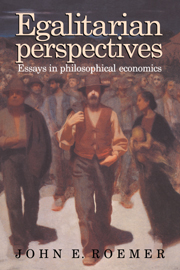Book contents
- Frontmatter
- Contents
- Acknowledgments
- List of sources
- Introduction
- Part I Exploitation
- Introduction to Part I
- 1 Exploitation, alternatives and socialism
- 2 Property relations vs. surplus value in Marxian exploitation
- 3 Should Marxists be interested in exploitation?
- 4 What is exploitation? Reply to Jeffrey Reiman
- 5 Second thoughts on property relations and exploitation
- Part II Equality of resources
- Part III Bargaining theory and justice
- Part IV Public ownership and socialism
- References
- Index
2 - Property relations vs. surplus value in Marxian exploitation
Published online by Cambridge University Press: 23 December 2009
- Frontmatter
- Contents
- Acknowledgments
- List of sources
- Introduction
- Part I Exploitation
- Introduction to Part I
- 1 Exploitation, alternatives and socialism
- 2 Property relations vs. surplus value in Marxian exploitation
- 3 Should Marxists be interested in exploitation?
- 4 What is exploitation? Reply to Jeffrey Reiman
- 5 Second thoughts on property relations and exploitation
- Part II Equality of resources
- Part III Bargaining theory and justice
- Part IV Public ownership and socialism
- References
- Index
Summary
Introduction
Marxian exploitation is defined as the expropriation of surplus labor, where the definition of surplus labor depends on the labor theory of value. Surplus labor is the excess of time labored by the worker over the amount of labor embodied in the bundle of goods the worker consumes, under the assumption that his entire wage is spent on that bundle. Thus, exploitation is said to exist because the amount of dead labor the worker can command through purchasing commodities with his income is less than the amount of labor he expends in production. If A is an exploited agent, then another agent B is said to exploit A if the surplus labor performed by A is embodied in goods which B appropriates. It is also generally assumed that this appropriation must occur as a consequence of A being hired by B. Expropriation is said to occur at the point of production.
Exploitation is a consequence of the private ownership of the means of production: the abolition of Marxian exploitation is supposed to be accomplished by eliminating this property relation in the means of production. Yet the definition of exploitation makes no explicit mention of this property relation. It is possible, however, to characterize Marxian exploitation using solely concepts of property relations, in particular, without reference to the concept of surplus labor and therefore to the labor theory of value.
- Type
- Chapter
- Information
- Egalitarian PerspectivesEssays in Philosophical Economics, pp. 37 - 64Publisher: Cambridge University PressPrint publication year: 1994
- 1
- Cited by



